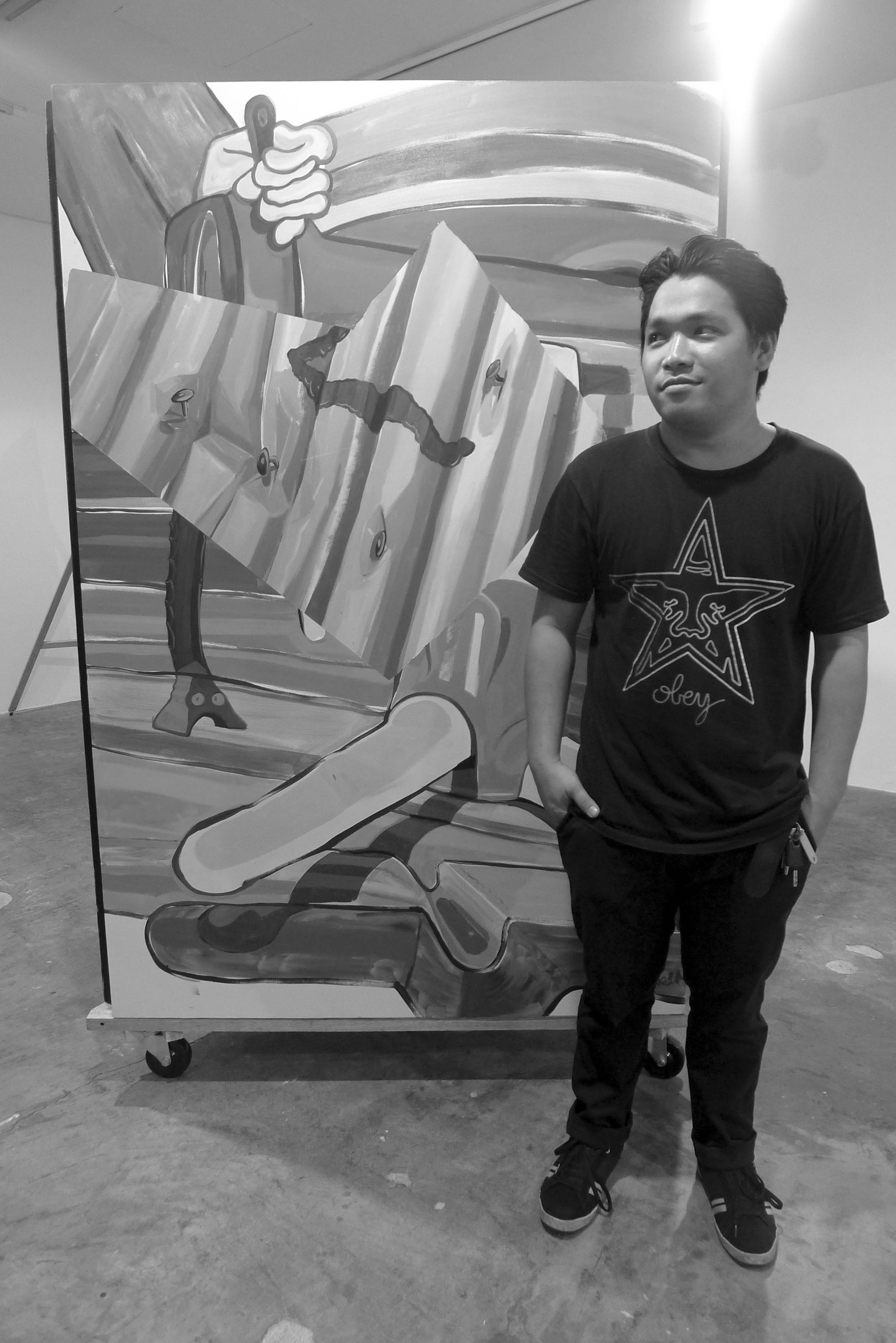
Collage may be considered the earliest form of sampling. Braque and Picasso sampled and brought elements from the real world to meld them all into the picture plane. Often considered as a seminal strategy in picture-making further ushering modernism, collage entailed much more than the idea of gluing something onto a surface. The glued-on elements which Braque and Picasso added to their canvases offered a new perspective on painting when these collided with the surface plane of the painting. Hence, collage became “a methodical reexamination of the relation between painting and sculpture.” Gino Bueza’s paintings are imbibed with such art historical awareness that samples from the pervasive realm of printed and virtual media, appropriating and cropping in organized randomness a picture that struggles to fit and solve the puzzle of its own pictorial logic. The way his paintings hang, or rather stand, on constructed stilts lends them a configurability that amplifies their puzzle-fit scheme.
These stands—rudimentarily constructed from recycled wood, casters, and an uncanny addition of paintbrush as an unwieldy leg support in some—make it possible for the paintings to be viewed from all sides while at the same time revealing their physical components: stretcher, support, ground, and pigment; although pigment here is laid on rather thinly at the limit of viscosity acrylic paint can permit. In one, the materiality of the canvas support is amplified by a rather large puncture, as though doubting Thomas has dipped his fingers through it, ripping a hole between and through dimensions of plasticity and materiality. But what remains suspect in such a work’s raison d’être: is it the duality of format or is it in its duality where doubts are cast? Or is it more a case of a suspension of disbelief while fingering through the void?
The paintings, while appropriating the look of collage and in some way the method of how different picture elements are arranged and composed, hark back instead to the mimetic tradition of paintings. Disparate images are juxtaposed and layered in a collage-like technique: where Bueza starts off by designating a shape on the surface by layering masking tape on its borders and painting within this shape, repeating the same process until the whole surface is filled up with a jumble of these cropped up shapes and images. The images are cropped to the extent that they only hint at a probable familiarity, e.g. a tool, a product label, a toy, etc. Bueza discloses, however, that these are mostly made-up, or rather they are conjured to aptly fit a composition, flowing like stream-of-consciousness images that have the semblance of or the imprint from the printed and virtual world—image déjà vu as a consequence of our image-saturated reality.
Take for instance a work with some text spelling out “LESS,” but which Bueza infers as truncated from “Lesser Majerus.” Google search yielded no exact information about this, but only gave out terms that either use one word or the other, e.g. Susan Majerus (970) 301-4189 6346 Lesser Dr Greeley colorado. This implies that the word is either completely invented or that our subconscious form links meanings to words or images that may not at all be related, but that their juxtaposition on a page or in a line or on a picture plane invariably generates their meaning or affinity by way of automatic collaging, as what the Surrealists have done.
This is neither novel nor groundbreaking, but the fact that it is being made, continually explored, and experimented with by Bueza seems to probe the possibility of paintings / works still having their own memories or pictures of themselves without necessitating signifiers outside of them. Leave it to doubters and cynics, there would always be a way to poke through these loopholes: ex nihilo nihil fit (nothing is created out of nothing).
About the Artist
About the Artists

Gino Bueza (b. 1987, Binangonan, Rizal) graduated with a degree in Painting from the University of the Philippines College of Fine Arts. He is a recipient of the Grand Prize from the 40th Shell Students’ Art Competition (Oil/Acrylic category), and an artist residency at Light and Space Contemporary (2012–2013). He is also a finalist Tanaw: Bangko Sentral ng Pilipinas Painting Competition (2011), and Shell Art Competition (2005, 2006). In 2017, Bueza has been shortlisted at the Ateneo Art Awards for his exhibition at West Gallery, Systems of Control. He has shown in both solo and group exhibitions at Blanc Gallery, TAKSU Singapore, Finale Art File, West Gallery, Artinformal, and Light and Space Contemporary.
Related Exhibitions
About the Artists
About the Artist
Gino Bueza (b. 1987, Binangonan, Rizal) graduated with a degree in Painting from the University of the Philippines College of Fine Arts. He is a recipient of the Grand Prize from the 40th Shell Students’ Art Competition (Oil/Acrylic category), and an artist residency at Light and Space Contemporary (2012–2013). He is also a finalist Tanaw: Bangko Sentral ng Pilipinas Painting Competition (2011), and Shell Art Competition (2005, 2006). In 2017, Bueza has been shortlisted at the Ateneo Art Awards for his exhibition at West Gallery, Systems of Control. He has shown in both solo and group exhibitions at Blanc Gallery, TAKSU Singapore, Finale Art File, West Gallery, Artinformal, and Light and Space Contemporary.

Related Exhibitions

Share

-1.jpg)

-2.jpg)
-3.jpg)
.jpg)
-1.jpg)
-2.jpg)
-3.jpg)
-4.jpg)
-5.jpg)
-6.jpg)
.jpg)




.jpg)




